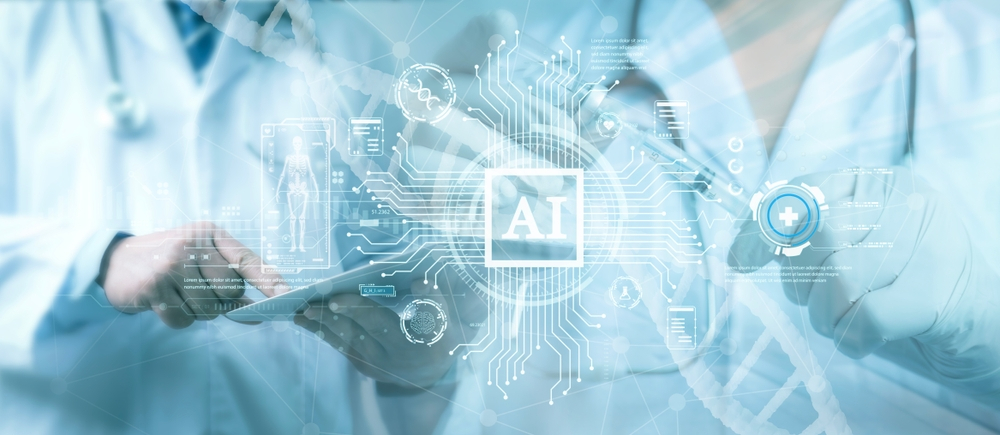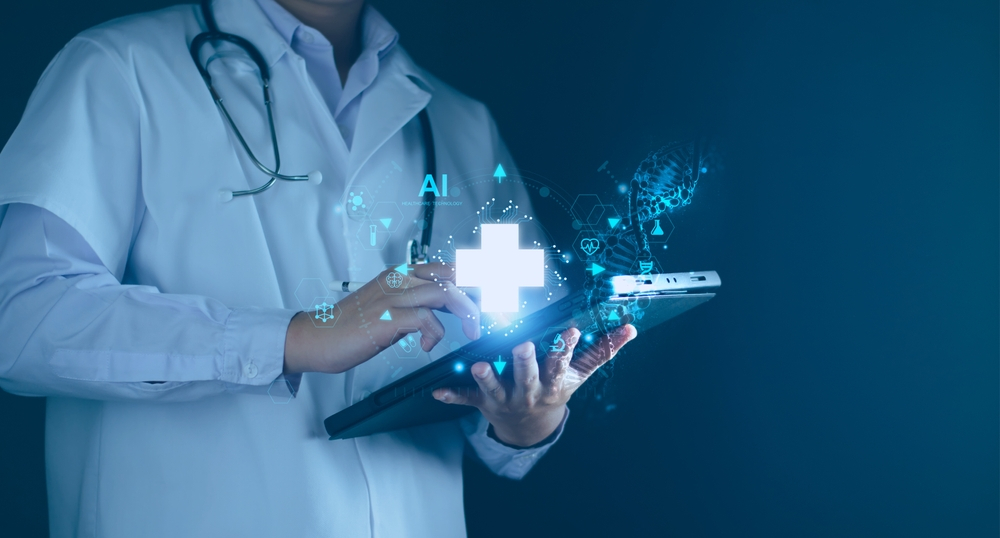Are you ready to witness how artificial intelligence is not just changing but revolutionizing the landscape of medicine and healthcare? As healthcare professionals, you are constantly seeking ways to enhance patient care and streamline operations. This is where artificial intelligence in medicine and healthcare steps in, providing solutions that transform complex challenges into manageable tasks with improved outcomes.
In this blog, we’ll dive deep into the top five breakthroughs of artificial intelligence in medicine and healthcare, showcasing how these innovations are not just futuristic concepts but practical tools enhancing treatment efficacy and operational efficiency today. From diagnostics to patient management, AI’s integration across various healthcare sectors is paving the way for advancements that were once thought to be decades away.
Our goal is to arm you with a clear understanding of how embracing these AI technologies can benefit your practice and patient outcomes. Additionally, we’ll introduce how MediCodio’s cutting-edge solutions are part of this transformative wave, integrating seamlessly into the healthcare ecosystem to support professionals like you in delivering superior care.
So, let’s explore these game-changing breakthroughs together, and see how AI is setting new standards in the medical field.

The Top 5 AI Breakthroughs in Healthcare
Enhanced Diagnostic Accuracy
Application of AI in Imaging and Diagnostics
Have you noticed how artificial intelligence in medicine and healthcare is revolutionizing radiology and pathology?
AI technologies are now extensively used to analyze medical images with a level of precision and speed that human eyes can’t match.
Impact on Healthcare
The integration of AI reduces diagnostic errors significantly. This not only ensures higher accuracy in diagnoses but also speeds up the entire diagnostic process.
For instance, AI-powered tools in radiology can identify anomalies in X-rays and MRIs faster than traditional methods, allowing for quicker, more accurate treatment decisions.
Real-World Examples
Imagine an AI system that can sift through thousands of images in the time it takes a human radiologist to review a handful.
These systems are equipped with deep learning algorithms that learn from vast datasets, making them increasingly effective.
This aspect of artificial intelligence in medicine and healthcare not only boosts diagnostic accuracy but also enhances the overall efficiency of medical procedures.
By integrating these AI capabilities, healthcare facilities can dramatically improve both the speed and reliability of the diagnostics they offer, leading to better patient outcomes and more efficient healthcare delivery.
Robotic Surgery: Precision and Efficiency
Application of AI-Driven Robotic Systems:
In the realm of artificial intelligence in medicine and healthcare, one of the most striking advancements is the use of AI-driven robotic systems in surgery. These robots, guided by AI, assist surgeons in performing complex procedures with a level of precision that enhances surgical outcomes.
Impact on Surgical Practices:
Have you ever wondered how surgeries could become less invasive yet more effective? AI-driven robotic surgery is the answer. These systems provide surgeons with enhanced dexterity and control, making surgeries less invasive and reducing the risk of complications. The precision of robotic arms means smaller incisions, which translate to quicker recovery times for patients.
Expanding Capabilities of Surgeons:
AI robotics are not just tools; they are partners that expand the capabilities of surgeons. For example, during a procedure, a robotic system can offer real-time data and images that are not visible to the naked eye, helping surgeons make more informed decisions during operations. This integration of artificial intelligence in medicine and healthcare is pushing the boundaries of what is surgically possible, enabling treatments that were once deemed too risky or difficult.
By embracing these AI-enhanced robotic systems, healthcare providers like you can significantly improve surgical outcomes and patient safety, showcasing just how transformative artificial intelligence in medicine and healthcare can be.
Predictive Analytics in Patient Care
Application of AI in Predictive Analytics
As part of the expanding role of artificial intelligence in medicine and healthcare, predictive analytics is a game-changer. AI is utilized to monitor patient vitals continuously and predict potential health crises before they escalate. This proactive approach allows for early interventions, potentially saving lives by addressing issues as they develop, not after they’ve become emergencies.
Impact on Patient Outcomes
Consider how transformative it would be if healthcare providers like you could foresee and prevent critical health events. AI in predictive analytics does exactly that. For instance, AI systems can analyze trends in heart rate data to predict cardiac events, allowing for preemptive care measures that can drastically reduce the risk of heart attacks or strokes.
Real-World Success Stories
Case studies have shown remarkable success in using AI to prevent life-threatening conditions. In one example, an AI system was able to predict sepsis in hospital patients hours before the condition manifested visibly, enabling timely treatment that saved lives.
Another case involved AI identifying subtle patterns in a patient’s vitals that suggested the onset of diabetic complications, prompting early intervention.
By integrating these AI-driven predictive analytics into your practice, you’re not just reacting to health issues as they occur; you’re staying one step ahead. This proactive approach, facilitated by artificial intelligence in medicine and healthcare not only enhances patient safety but also improves overall treatment outcomes, transforming how care is delivered. Embrace this technology to make a significant impact in your patients’ lives, leveraging AI to foresee and forestall health crises effectively.
Personalized Medicine Through AI
Application of AI in Personalized Medicine
In the realm of artificial intelligence in medicine and healthcare, AI is revolutionizing how treatments are tailored to individual patients. Its role in genomics and drug development is pivotal, enabling the creation of highly personalized treatment plans that are specific to the genetic makeup of each patient.
Enhancing Treatment Efficacy
Imagine being able to predict exactly which treatment will work best for you based on your unique genetic profile. That’s what AI in personalized medicine offers. By analyzing massive datasets from genetic information, AI algorithms can identify patterns and predict outcomes that help in selecting the most effective drugs and treatment protocols for individual patients.
Impact on Patient Care
The use of artificial intelligence in medicine and healthcare significantly boosts the efficacy of treatments. For instance, in oncology, AI-driven insights allow for the customization of chemotherapy regimens that are optimally effective against specific cancer types in individual patients, thereby enhancing success rates and reducing side effects.
By incorporating AI into genomics and drug development, healthcare providers like you can offer more precise, effective, and personalized medical solutions. This application of artificial intelligence in medicine and healthcare not only improves patient outcomes but also paves the way for future advancements in how medical treatments are developed and administered.

Streamlining Administrative Processes with AI in Healthcare
The integration of artificial intelligence (AI) into healthcare is revolutionizing not just patient care but also the administrative backbone that supports it. Here’s how AI is transforming these crucial operations:
Revamping Medical Coding and Billing
In the complex world of healthcare, the accuracy of medical coding directly influences billing and reimbursement processes. AI-powered systems, like MediCodio’s CODIO, are essential for enhancing the precision of medical coding. By ensuring higher coding accuracy, these systems help streamline the billing cycle, reducing errors that could lead to claim denials and delays in payments.
Improving Administrative Efficiency
AI doesn’t just work behind the scenes; it’s at the forefront of reducing administrative overhead. By automating routine tasks such as data entry and patient scheduling, AI allows administrative staff to focus on more critical, value-added activities. This shift not only optimizes workflow efficiency but also improves service delivery to patients.
Enhancing Revenue Cycle Management
AI’s impact on revenue cycle management is profound. Through tools that automate claims processing and denial management, AI helps healthcare providers manage these financial interactions more effectively. This technology ensures that claims are accurate and submitted in a timely manner, which accelerates the reimbursement process and enhances the overall financial health of healthcare institutions.
Reducing Operational Costs
By automating repetitive administrative tasks, AI significantly cuts down on operational costs. These savings can be redirected towards improving patient care or expanding healthcare services, thereby enhancing the overall functionality and competitiveness of healthcare providers.
By embracing AI, healthcare providers can achieve a more streamlined, efficient, and error-resistant administrative process. This not only bolsters the financial stability of healthcare institutions but also contributes to a more focused and effective patient care system.
Future Implications
Each AI breakthrough holds the potential to not only improve current practices but also radically change future healthcare delivery:
- Wider Adoption Across Specialties: As AI proves its efficacy and reliability, more healthcare specialties will adopt these technologies, expanding their benefits across the entire healthcare spectrum.
- Continuous Learning Systems: AI systems are poised to evolve from static tools to dynamic learning systems that improve over time, offering increasingly sophisticated insights and capabilities.
- Enhanced Patient-Centric Care: AI will enable even more personalized patient care by leveraging continuous data collection and advanced analytics to tailor treatments to individual patient needs more effectively.
Conclusion
The breakthroughs of artificial intelligence in medicine and healthcare are setting the stage for a transformation filled with improved efficiencies, enhanced patient care, and innovative treatment solutions. As these technologies continue to evolve, their potential to reshape the healthcare landscape becomes even more profound.
For RCM professionals and healthcare providers, now is the time to consider how AI-based tools like MediCodio’s CODIO can simplify and optimize complex administrative processes. Adopting such advanced technologies not only streamlines operations but also positions your practice at the forefront of medical innovation.
We encourage you to explore the possibilities that CODIO from MediCodio offers. Embracing these AI solutions can lead to significant improvements in your administrative efficiency and overall healthcare delivery, ensuring you stay competitive in a rapidly evolving industry.
FAQ’s
What is MediCodio’s CODIO app?
MediCodio’s CODIO app is an advanced AI-driven system designed to enhance medical coding accuracy and efficiency in healthcare administration. It utilizes artificial intelligence to streamline coding processes, reduce errors, and ensure compliance with healthcare regulations.
How does the CODIO app improve medical coding processes?
The CODIO app improves medical coding processes by using AI to automatically analyze medical documentation and accurately assign the appropriate codes. This not only speeds up the coding process but also significantly reduces the likelihood of billing errors, leading to faster reimbursement.
Can MediCodio’s CODIO integrate with existing healthcare systems?
Yes, MediCodio’s CODIO is built to seamlessly integrate with existing healthcare systems. Its flexible architecture allows it to connect with various electronic health records (EHRs), billing systems, and other healthcare management tools, facilitating a smooth workflow transition and data synchronization.
What are the benefits of using AI in medical coding for healthcare providers?
Using AI in medical coding, like the technology found in MediCodio’s CODIO app, offers several benefits, including increased coding accuracy, reduced claim denials, enhanced compliance with fast-changing healthcare regulations, and improved overall efficiency in revenue cycle management.
How does MediCodio ensure the security of patient data?
MediCodio prioritizes the security of patient data by adhering to strict data protection standards, including HIPAA compliance. The CODIO app employs advanced encryption methods, secure data storage solutions, and continuous monitoring to safeguard all patient information against unauthorized access and data breaches.





